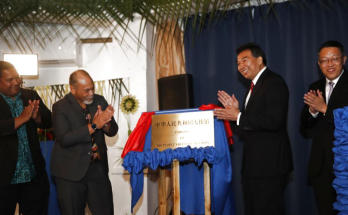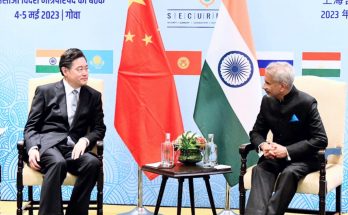Ahead of President Xi Jinping’s visit to India next month, China has invited India to join its ambitious project of building a network of new silk roads on land and sea, a project that aims to revive the ancient trade routes of the region.
In a briefing to international reporters in Xian, Chinese officials highlighted the importance of India in this project. Xian, the ancient capital of China, and the starting point for the ancient Silk Road, also houses the Wild Goose Pagoda built in memory of Xuanzang’s visit to India.
“The Chinese government believes that India is a naturally important partner in this one belt and one road,” said Gao Zhenting, councillor, department of international economic affairs in Xian.
“From the historical point of view, India is the converging point of the Maritime Silk road (MSR) and the ancient Silk Road on land. For more than 2,000 years India had very good exchanges with China through the passage of the South Silk Road,” said Gao.
Proposed by President Xi Jinping during his first visit to Southeast Asia, the project calls for increased maritime cooperation between China and ASEAN countries. Initially focused on the ASEAN region, the scope of the project has expanded to include the Indian Ocean. Xi’s grand ambition of the 21st century Maritime Silk Road, which seeks to connect China’s coastline with Southeast Asia, the subcontinent, the Gulf and the East coast of Africa, is a sign of China’s efforts to become a formidable maritime power. China will build hard and soft maritime infrastructure as a part of the project, including new ports and special economic zones. China has already announced a fund of $500 million to promote the Maritime Silk Road in Southeast Asia. The details of the proposal are not clear, but a recent Xinhua report states that China will assist countries in customs coordination, quality supervision, e-commerce and developing necessary institutional frameworks.
The proposal also seeks to revive the ancient trade route connecting China’s Xian city to Central and Western Asia and the Mediterranean. These roads also include the Pakistan economic corridor which connects Kashgar in Xinjiang and Gwadar on the Arabian Coast, running through Pakistan-occupied Kashmir. India is already linked to the Bangladesh China India Myanmar (BCIM) project that connects the four countries through an economic corridor.
Undoubtedly, Indian security officials are also wary of China’s Silk Road proposals. India has been increasingly apprehensive of Chinese investments in ports in the Indian Ocean region and road constructions in areas disputed by India.
“We are open to all friendly neighboring countries participating in this one belt and one road, but of course we will not force any one to join, nor we will give up if someone is not taking part,” said Gao. He also said that the new Chinese projects did not aim at reinforcing China’s influence in the region.
With Xi Jinping visiting India next month, the latter will have to make up its mind on being a part of the project. With many Asian countries already agreeing to be part of the proposal, it may be difficult for India to be an outlier.
Author Profile
- India Writes Network (www.indiawrites.org) is an emerging think tank and a media-publishing company focused on international affairs & the India Story. Centre for Global India Insights is the research arm of India Writes Network. To subscribe to India and the World, write to editor@indiawrites.org. A venture of TGII Media Private Limited, a leading media, publishing and consultancy company, IWN has carved a niche for balanced and exhaustive reporting and analysis of international affairs. Eminent personalities, politicians, diplomats, authors, strategy gurus and news-makers have contributed to India Writes Network, as also “India and the World,” a magazine focused on global affairs.
Latest entries
 DiplomacyApril 23, 2024Resetting West Asia, re-booting the world, but not fast enough: T.S. Tirumurti
DiplomacyApril 23, 2024Resetting West Asia, re-booting the world, but not fast enough: T.S. Tirumurti India and the WorldApril 22, 2024India’s G20 Legacy: Mainstreaming Africa, Global South in global agenda
India and the WorldApril 22, 2024India’s G20 Legacy: Mainstreaming Africa, Global South in global agenda DiplomacyApril 10, 2024Diplomat-author Lakshmi Puri pitches for women power at LSR
DiplomacyApril 10, 2024Diplomat-author Lakshmi Puri pitches for women power at LSR India and the WorldApril 6, 2024UN envoy pitches to take India’s solutions to the world stage
India and the WorldApril 6, 2024UN envoy pitches to take India’s solutions to the world stage







